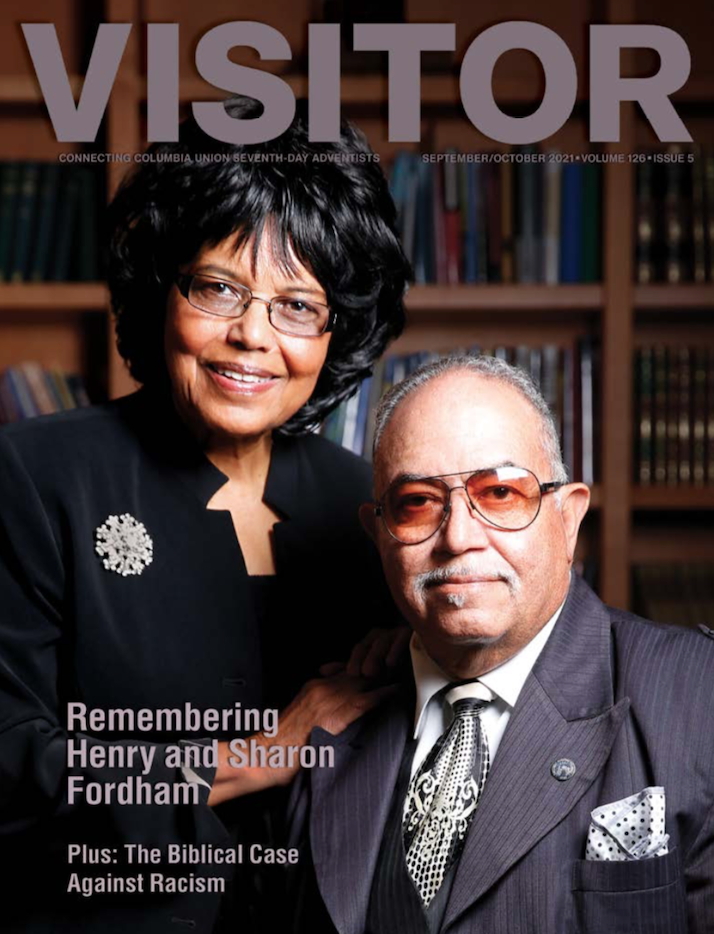
Created in His Image, The Biblical Case Against Racism
Story by Jiří Moskala
Amadeo Molnár, one of my favorite church history teachers, once said, “The history of the Christian Church is the history of the interpretation of the Bible.” Unfortunately, many modern problems arise from the misinterpretation of God’s Word. Divisions were created and wars fought because of certain dogmas; millions were tortured, killed or enslaved due to specific ideologies and wrong belief systems by believers. So many atrocities were committed in the name of God. And over the years, the Bible has also been used to justify racism.
Ironically, the original Bible text does not have a specific term for race, meaning there is no concept of race developed in the Holy Scriptures and that the Bible cannot be taken to justify any form of racism. Period. It’s important to remember that each translation of the Bible is already an interpretation of the biblical text. Some Bible translations put the term “race” into English versions, even though no words for “race” or “racism” are found in biblical Hebrew, Aramaic or Greek.
The King James Version translation, which was published in 1611, includes no term for “race” in the biological or ethnic sense. Not even once. The English term “race” is actually a modern term that was introduced in the late 16th century and then evolved in the 17th century. When colonization was established and anthropological theories were combined with evolution, only then did race vocabulary in the biological or ethnic sense thrive.
When one researches modern translations of the Bible, they will find the term “race” used more often. For example, “human race” appears in the New International Version (NIV) six times in the Old Testament, describing there is only one humankind (Genesis 6:5, 7; Job 28:28; Psalm 12:1, 8; Ecclesiastes 3:10). This term is neutral because God created only one race—namely humans.
Without diminishing modern translations as a whole—for most terminology in them is translated from the original Bible text—there are a few verses that are dangerous and explosive. In Ezra 9:2, translators of the NIV, English Standard Version (ESV) and New Living Translation render the Hebrew words zera‘ haqqodesh as “holy race,” meaning Jews returning from the Babylonian exile. But this Hebrew phrase simply means “holy descendants, offspring” (literally “holy seed”). In the New Testament, Romans 9:3 speaks about “people of my own race” (NIV), namely Jewish people. The word genos (people, kind, kindred, descendants) is rendered in Acts 7:19 as “race” in the sentence that Pharaoh “dealt shrewdly with our race” (ESV). So, the Jews are referred to as having a “special” race, and suddenly, the Jewish race is “created.”
In 1 Peter 2:9, the New American Bible, Revised Standard Version and ESV speak about Christians as being a “chosen race” (genos eklekton simply means “chosen people”). Thus, one may detect a trend in those translations—modern versions more often use the term “race” with its ethnic meaning.
 Examples of Prejudice in the Bible
Examples of Prejudice in the Bible
Even though the term “race” does not occur in the original languages of the Bible, the Holy Scripture does speak against racism in principle. God, through His writers, addresses attitudes and issues that lie at the root of racism or are very similar to racism. Prophets and other writers speak eloquently against the spirit of antagonism, bias, prejudice, bigotry, xenophobia, ethnocentrism, hatred, discrimination, exploitation, unfairness and injustice.
Although the Bible does not have a specific term for race, it clearly deals with the same problematic attitudes—the spirit of racism. Four brief examples of this include: (1) Miriam and Aaron criticized Moses because he married a foreigner, a Cushite woman (Numbers 12:1); (2) Haman in the book of Esther wanted to annihilate Jewish people living in MedoPersia because he hated Mordecai (Esther 3:5–6); (3) the Early Christian Church, consisting of Jewish believers in Jesus Christ, were not ready to open their doors to the believing Gentiles, so God had to specially intervene and give visions to Cornelius and Peter bringing them together. And then Peter was willing to baptize the believing Gentiles after the Holy Spirit was given to them (see Acts 10–11); (4) in the Early Church, there was a complaint by believing Greeks that their widows were neglected in comparison to Jewish widows, so deacons were elected to deal properly with this tension (see Acts 6:1–6).
Biblical Principles Against Racism
1. The first fundamental principle for dealing with racism is derived from the creation story (Genesis 1—2). God did not create races, but one humankind. We are one diverse family. Everybody is created equal by God because we are all created in the image of God (Genesis 1:26–27). This recognition does not rule out diversity; on the contrary, because diversity is God’s marvelous creation, it must be celebrated. God made us from “one” person, so we are one in plurality (Acts 17:26) and “God’s handiwork” (Eph. 2:10, NIV).
There should not be any discrimination based on gender or color, so we need to be extremely careful when we talk about race. I personally prefer to speak about diversity in color or ethnic diversity, but we need to underline that we are one humankind, one humanity. Different skin colors are not a result of sin or the tower of Babel incident. Diversity was already planned and planted by God during creation week.
2. The second principle of how to fight against racism is in recognition of the two greatest commandments of love: loving God and loving our neighbor as ourselves (Matthew 22:37–40; Luke 10:25–37).
In John 15:12, Jesus explains how to love our neighbor as ourselves. The best interpretation of how to do so is in the parable of the Good Samaritan. When the teacher of the law asked, “Who is my neighbor?” Jesus answered in practical terms that it was the “person who is in need that you sacrificially help.” Jesus turns it upside down and asks, “To whom are you a neighbor?” Later, in 1 John 4:20, John says, “Whoever claims to love God yet hates a brother or sister is a liar. For whoever does not love their brother and sister, whom they have seen, cannot love God, whom they have not seen” (NIV).
3. The third principle is the summary of the law and the prophets. Jesus summarized it in one sentence, known as the Golden Rule, found in Matthew 7:12: “Do to others whatever you would like them to do to you” (NLT). In Philippians 2:3, Paul is saying the same thing but using different words when he speaks about the ultimate model of humility by pointing to Christ’s incarnation and what He did: “In humility, count others more significant than yourselves” (ESV).
4. The fourth principle is connected to the nature of God. When God states that He is not a respecter of persons, then we should behave as He does. There is no partiality with God. We should be like God, who does not show favoritism (James 2:1). In other words, we should not pay special attention to some and ignore or denigrate others.
5. The fifth principle is that the Holy Spirit breaks all biases and prejudices, discrimination, unfairness, bigotry and hatred, without exception. The Holy Spirit is given to “all flesh” (Joel 2:28–29)—sons and daughters, old and young, men and women, slaves (female or male). Thus, the Holy Spirit is leading in equalizing human relationships.
6. The sixth principle is the plan of salvation. All are sinners and saved in the same way. There is one God, one gospel, one salvation, one people, one way of salvation—Jesus (Romans 3:22–24; Ephesians 1:10; 3:6; 4:3–6; Colossians 2:6–10).
7. And the seventh principle stresses our identity in Christ. When we are in Christ, we are a new creation. Our identity is in Christ, not in our nationality, color of skin, gender, culture, sexuality, education, position, social status or financial situation. In 2 Corinthians 5:17, Paul speaks about one family in heaven and on earth, when he says, “Therefore, if anyone is in Christ, he is a new creation” (ESV).
 Theological Safeguards Against Racism
Theological Safeguards Against Racism
Seventh-day Adventist biblical theology has tools and anchors to forestall and fight wrong attitudes and racial prejudices. These very important theological defenses should keep us from the path of racism and bigotry.
• Our theological system is rooted and built on creation. And in creation, we are all created in the image of God. We are all equal.
• The second point, related to our first theological anchor, is the Sabbath—rest in God. On Sabbath, all are granted a new quality of life, liberation, freedom and equality.
• The great controversy explains the awful problem of sin and the wonderful plan of salvation to free humans from sin—we are all saved in Jesus Christ. Galatians 3:26, 28 plainly states that there are no social divisions regarding salvation: no nationality, ethnicity, sexuality or culture. Nothing plays a role. For in Christ Jesus, we are all children of God through faith. There is neither Jew or Gentile, slave or free, male or female, for all are one in Christ Jesus.
• To understand the theology of the Triune God is to understand a community of love. Understanding God’s loving community, and that we were created in His image, should help us understand that God wants to create within us a community of love with each other where all are equal as the heavenly Trio are equal. Therefore, in our community of love, we must seek to build a community of equality and unity in Christ. With the triune understanding of God, the Holy Spirit is given to all, uniting us all in love, in spirit and in truth (Joel 2:28–29).
• Our prophetic interpretation of the Scriptures is important, especially the cleansing of the sanctuary (Daniel 8:14). What does it mean when we speak about 1844, the 2,300 evenings or mornings and the sanctuary being cleansed? The main point is the restoration of truth. God’s whole prophetic movement should restore the truth, and with the restoration of truth comes the restoration of right relationships. We have here a very important anchor involving restoring the truth, restoring right attitudes, restoring right motives and being cleansed completely.
• When it comes to the divine judgment, there is no partiality. No one has a special status before God. We are all equal, and God always has the last word when it comes to judgment.
• The three angels’ messages, found in Revelation 14, is the remedy for our divided world. All our divisions are listed: different nations, tribes, languages and people. And according to Revelation, the beast of all these different classes wants to dominate. But the three angels’ messages are calling for unity in the gospel message, which is the remedy for division and divisiveness. In the end, everybody who believes in Christ is saved. This is our message to unify, not divide.
Tearing Down the Walls
Philemon was a wealthy person, and his slave Onesimus, whose name means “useful,” was a fugitive. Onesimus probably stole from his owner, deserted him and fled. The story tells us that all walls of separation and inequality must be torn down. Paul’s letter is eloquent and teaches Philemon how to relate to his former slave.
Key statements from Paul’s letter practically demonstrate the principles to apply in destroying racism. They also illustrate how these principles, if correctly interpreted, transform relationships and abolish slavery from within by changing attitudes toward each other. Paul appeals to Philemon “on the basis of love” (v. 9, NIV). Paul states:
“I appeal to you for my son Onesimus” (v. 10). Now Onesimus is not a slave but a son— a son of Paul.
“Formerly he was useless, but now he has become useful both to you and to me” (v. 11). Onesimus was once useless. (Notice the play on his name!)
“You might have him back forever—no longer as a slave, but better than a slave, as a dear brother” (vv. 15–16). He is now not only a brother, but a dear brother.
“He is very dear to me but even dearer to you, both as a fellow man and as a brother in the Lord” (v. 16). Wow! He needs to now accept him not only as a human being, but as “a brother in the Lord.” “
Welcome him as you would welcome me” (v. 17). Very practical point.
“If he has done you any wrong or owes you anything, charge it to me” (v. 18). Forgive him!
I am confident as I write this letter that you will do what I ask and even more!” (v. 21, NLT). This is how the love of God is compelling and leading us. Thus, Paul’s letter to Philemon is a clear example of transformation of relationships. It is about the change from within in thousands of lives as the gospel was preached.
 Our Great Opportunity
Our Great Opportunity
During this special time before Christ’s second coming, Seventh-day Adventist Christians are called to model God’s character of love, impartiality and truth. The mission of the remnant is to restore God’s truth in real, loving relationships and model what it means to have beautiful and meaningful relationships in Christ Jesus as a community of faith. We are all responsible for creating and cultivating meaningful relationships in order to not be found guilty of neglecting these basic principles, because we are all accountable for our behavior to our Creator, Redeemer and Judge (Romans 14:10–12; 2 Corinthians 5:10).
The gospel changes lives. When biblical values, creation and redemption theology are accepted, a new identity in Christ is assumed, bringing a radical transformation of relationships where equality and diversity is celebrated. In this way, we can truly be one as Christ was, praying for His followers (John 17:20–23; Ephesians 4:1–3; Philippians 2:1–5). Only the Holy Spirit has a power to transform our thinking, emotions, desires, imagination, attitudes, goals, priorities and actions to create new, meaningful and lasting relationships. Ellen White aptly states, “A true, lovable Christian is the most powerful argument that can be advanced in favor of Bible truth” (Review and Herald, January 14, 1904).
Dig Deeper
• Join us September 24, 7 p.m., for a Visitor News Live discussion on “Why We Still Need to Talk About Race and Social Justice.” Tune in via our Visitor Facebook or YouTube pages.
• On October 1–2, Washington Adventist University will host the G. Arthur Keough Two-Day Summit, themed “Overcoming Disunity in the Body of Christ: Concrete Steps.” To watch or register, visit columbiaunionvisitor.com/keough-conference.
• On October 14–16, the Seventh-day Adventist Theological Seminary at Andrews University will host the Congress on Social Justice, an event designed to highlight global issues of imbalance and the biblical solutions that address them. Find out more at columbiaunionvisitor.com/socialjusticecongress
Jiří Moskala serves as dean of the Seventh-day Adventist Theological Seminary on the campus of Andrews University (Mich.) and professor of Old Testament Exegesis and Theology.
 Read and Share the September/October articles:
Read and Share the September/October articles:- Editorial: Remembering the Fordhams
- Created in His Image, The Biblical Case Against Racism
- How Recent Court Cases Could Impact Religious Liberty
- New Chief Financial Officer Joins Allegheny West Conference
- New Jersey Conference Celebrates 120 Years With a Concert
- New Jersey Conference to Welcome New Treasurer
- Ralph Martin, Former Columbia Union Conference President, Passes Away
- Read news in French
- Read news in Spanish

Add new comment